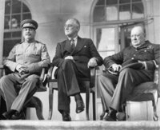
Allies of World War II
The Allies of World War II were the countries that opposed the Axis powers during the Second World War . Former Axis states contributing to the Allied victory are not considered Allied states...
Timeline of Events
|
1939
|
|
|||||||||||
|
1940
|
|
|||||||||||
|
1941
|
|
|||||||||||
|
1942
|
|
|||||||||||
|
1943
|
|
|||||||||||
|
1944
|
|
|||||||||||
|
1945
|
|

